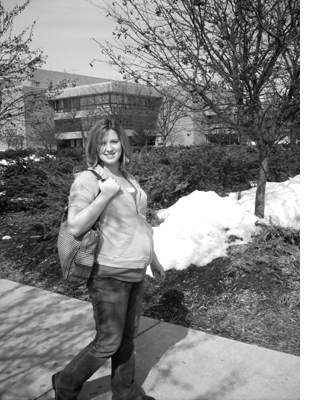by Chaunie Brusie
 As founder and president of my school’s pro-life group, I thought I was doing my best to support the cause. I flyered, I tabled, I marched. I even interned at Feminists for Life. But through it all, I never truly understood the reality for a woman facing an unplanned pregnancy — until I stood in my apartment and looked down at the two tiny blue lines on my home pregnancy test.
As founder and president of my school’s pro-life group, I thought I was doing my best to support the cause. I flyered, I tabled, I marched. I even interned at Feminists for Life. But through it all, I never truly understood the reality for a woman facing an unplanned pregnancy — until I stood in my apartment and looked down at the two tiny blue lines on my home pregnancy test.
At that moment, I realized how easily a woman could turn to abortion. And as I searched my college campus for the help and guidance I needed, I also recognized the impact that a lack of resources and support for pregnant and parenting students can have on a young woman’s decision. The stress and emotions of an unplanned pregnancy — which my fellow student parent Elly Levesque of Massachusetts describes as “the panic taking over” — coupled with the oftentimes overwhelming search for basic needs such as healthcare and housing, can lead a woman to feel that she has no choice.
Student parents on campuses across the country often find that practical resources and emotional support are missing. For women like Athena Sykes of Illinois, the message is clear: “I was told repeatedly that I would never be able to be both a mother and a student; I would have to choose.”
Levesque also knows that pressure. Her father’s family thought if she continued her pregnancy she would be “throwing it all away.” “They said I would end up as trailer trash and on welfare,” Levesque recalled, “because I couldn’t possibly do it all.” It was difficult to resist the pressure from others combined with her own panic.
“I wanted to get an abortion,” Levesque said, “and my family wanted me to [get an abortion], too. I even had an appointment, but my boyfriend spent hours on the phone trying to talk me out of it. If he had encouraged me to get an abortion, too, I would have done it.”
It is especially difficult for pregnant women to continue their pregnancies if they lack the insurance coverage they need to receive proper prenatal and maternal healthcare. While many schools do offer students the option of paying for student insurance coverage, most of these plans do not offer maternity coverage. Christina Dunigan, a married student with a planned pregnancy, discovered the challenges of finding adequate maternity care without the proper coverage. After being informed of her positive pregnancy test at a local Planned Parenthood, the counselor there asked her, “Is this good news, or bad news?” Dunigan recounts: “My hackles went up. If I answered, ‘Bad news,’ I was sure she’d probably just pick up the phone and arrange an abortion for me without giving it another thought. I answered that it was good news… but I didn’t have medical insurance.”
Without insurance, Dunigan was treated poorly and turned away from a local midwives’ clinic. “They never flat out tell you to have an abortion,” she sobbed to her husband, “but they make it very clear that they expect you to!” Eventually, a kind midwife sought out the couple and worked with them to arrange a payment plan. Dunigan and her husband searched for catastrophic insurance coverage but were denied because of Christina’s pregnancy. “We were told that we should have thought of this before I became pregnant,” she recalled.
FFL President Serrin Foster winces when she hears stories like these: “Too often, women are told they should have planned their unplanned pregnancies. Pregnancy and parenting should not terminate an education, but it can and often does when those who talk about ‘choice’ don’t take steps to support the rest of the choices, or when pro-lifers don’t focus on practical resources and nurture life.”
Student parents often require creative educational options that take into account their health needs and scheduling challenges. Flexible, online, weekend, or evening classes may better accommodate pregnant students who miss class due to morning sickness, as I did, or who require leave in the middle of the semester to give birth. As Sykes noted, “Online college courses make an advanced education a possibility for everyone.” Dunigan found the help she needed through her advisor’s willingness to be flexible. “With my required classes by independent study and was able to schedule classes so that either my husband or I could be with the baby — which meant no childcare expenses, no separation anxiety, and we graduated on schedule,” she said. While Dunigan was recovering from childbirth, her writing seminar even agreed to meet in her living room in order to accommodate her.
Housing is another pressing issue for student parents and families. Many college students are required to live on campus; others cannot find safe, affordable off-campus housing. Stacey Hamilton of Allendale, Michigan, who serves as the Secretary of Grand Valley State University’s Students for Life group, knows how difficult it can be for student parents to secure appropriate housing: “I was really struggling with trying to get through school as a single mom and seriously contemplated dropping out of college yet again. I didn’t have any fight left in me. I didn’t hear all that much about [family housing] until I was ending my junior year and… at the point of dropping out. Even though GVSU does offer family housing, it is pretty obsolete, as there are very few kids here. When I first heard about it, I didn’t understand how it worked, and no one seemed willing to explain it to me.”
Childcare presents one of the greatest challenges for student parents. As many parents have discovered, childcare on or near campus is either lacking altogether or too expensive and restrictive (for instance, many school daycare facilities accept children of faculty only, have long waiting lists, or restrict their care to older children). Levesque found this to be the case at her school; as she noted, “There was a small care center for children on campus, but they had to be at least 2 years and 9 months old and potty-trained.” Leah Outten of North Carolina often “wished [my school] had an on-campus daycare available.” She emphasized the possible benefits for parents as well as for students who need jobs or experience in caring for and educating children: “I’ve seen other colleges have this option, and it’s not only a great place for students — including education majors — to work to gain experience, it also helps out staff and student parents tremendously to have their children so close.”
Nicole Raterink of Michigan, whose daughter requires treatment for two chronic illnesses, suggests that on-campus health clinics should also make their services available to the children of students. “Oftentimes, my daughter has to be taken into the emergency room just to get an antibiotic which could have easily been given to her on campus at Health Services in a much shorter time period,” she said.
Breastfeeding resources are often deficient as well, as student parent Alicia Gwizdala, a recent graduate of Saginaw Valley State University in Michigan, discovered: “I soon realized that I had to find a different way to pump because my school did not have any resources available or a place where I could pump. I had to find another way somehow. Breastfeeding is encouraged by all of the experts; however, at my school there were breastfeeding barriers.” Breastfeeding mothers on campus, staff and students alike, would benefit from the establishment of school-designated nursing rooms to promote comfortable and private pumping or nursing.
Emotional support is of the utmost importance and may be supplied by seeking out a community of other student parents. “After having my daughter, I lost most of my college friends due to the inability to drop everything and go out,” Raterink noted. “A play group on campus would be a great support system for parents like me, a safe place to bring our kids to play while we parents are able to meet, share stories, and share experiences.” Outten echoes the need for student parents to connect: “It would have been great to connect people my age whose life priorities were more than parties and sororities, [whose lives] revolved around another little being.”
Lack of training among university officials, faculty, and staff can also pose a challenge for pregnant and parenting students, which is why Feminists for Life supports the training of health clinic and counseling staff, residential advisors, professors, athletic coaches, and all those who might be in a position to help. As Stacey Hamilton said, “I understand that [student parents] are a minority, but colleges and universities should be more understanding of parents who are attending college and gear part of their orientations to addressing these issues.” Financial aid offices should also be aware of policies, grants, and frugal solutions, such as FFL’s resource guide “Raising Kids on a Shoestring,” that may help pregnant women, birthparents, and parents complete their education.
Feminists for Life advocates a central place on campus to have access to the full scope of resources available. For a woman facing an unplanned pregnancy, the availability of complete and accurate information could make all the difference. Without proper resources and support, the stress of facing an unplanned pregnancy can cause a woman to consider dropping out of school completely or turning to abortion. As Gwizdala recalled, “Education was the furthest thing from my mind. I wanted to quit school. I was so overwhelmed. When I first found out I was expecting, I had no information on what to do or where to go from there.” Sadly, many resources that are available are poorly advertised to students, who may have no idea such resources even exist. A central office, website, or staff member on campus can facilitate awareness between departments and provide crucial support.
“The first step of a campus revolution starts with awareness,” says Serrin Foster, who has moderated FFL Pregnancy Resource ForumsSM on campuses across the country. “The next step must be policy development. Identifying and providing resources and connecting students to off-campus resources come next. We also need to look at our attitudes towards pregnant women, birthparents, and parents. The real shame is when a pregnant woman is driven to abortion by unsupportive family and friends and when parents quit school.”
While there are many struggles faced by pregnant and parenting students, and there is still a lot of work to be done transforming the culture of college campuses, Feminists for Life recognizes the joys and rewards that refusing to choose can bring. After early pressure to abort her son, Levesque made the choice to parent instead and shared her pride in her academic successes: “My family, immediate and extended, save for only a few individuals, heavily pushed abortion, telling me that I was a disappointment and I had so much potential that I was wasting. I graduated this past May at age 23 with a B.A. in Sociology, magna cum laude, and the highest GPA in the department. I am now the first individual on that pro-abortion side of the family to graduate from college.”
For student fathers, too, there are great rewards that come with parenting. As Ben from Mott Community College in Michigan said simply, “It is hard to work, parent, and be a student full-time, but all I can say is that it was all worth it.”
According to Sykes, parenting can provide additional motivation for parents to succeed in the classroom as well. “Classmates, certain acquaintances, and even some perfect strangers told me that I would regret having my son because he would ruin my life. They were wrong,” she said. “My son, and now my child due in February, have made me more motivated than ever to be a success in all things.”
Kids on a Shoestring was an earlier iteration of our helpsite Women Deserve Better. Learn more about Women Deserve Better at womendeservebetter.com







